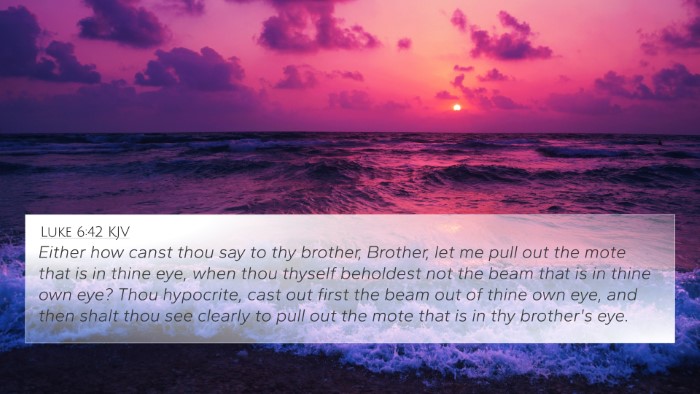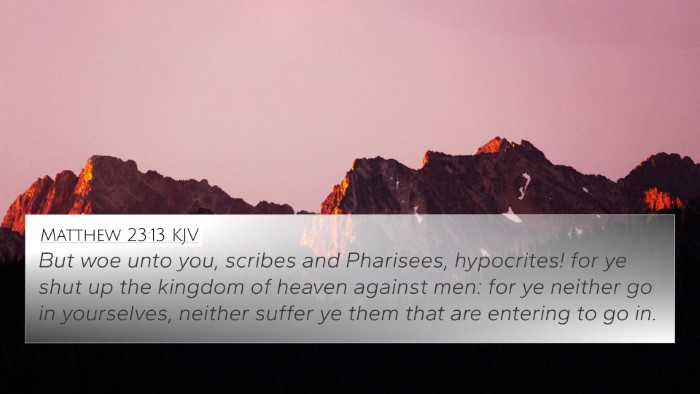Understanding Matthew 7:5
Verse: "Thou hypocrite, first cast out the beam out of thine own eye; and then shalt thou see clearly to cast out the mote out of thy brother's eye." (Matthew 7:5)
This verse is part of Jesus’ teachings in the Sermon on the Mount, emphasizing the importance of self-examination before judging others.
Meaning and Interpretation
Self-Reflection: Matthew Henry notes that this verse admonishes individuals to reflect on their own faults prior to addressing the faults of others. It serves to highlight human fallibility and the hypocrisy of those who focus on minor faults in others while ignoring their own significant shortcomings.
Judgement and Clarity: Adam Clarke expands on this by stating that the "beam" represents a larger sin or fault in oneself, whereas the "mote" signifies a smaller issue in someone else. This comparison demonstrates the skewed perspective we may have when overlooking our failings while critiquing others.
Key Insights from Commentators
- Matthew Henry: Emphasizes humility and self-awareness in spiritual discernment.
- Albert Barnes: Points out that the directive to "cast out the beam" is not permanent; it acknowledges the necessity of correcting one's faults first, enabling clearer vision in helping others.
- Adam Clarke: Discusses the practical application of this verse in community life, where mutual support should be grounded in self-examination.
Bible Cross-References
Matthew 7:5 connects with several other scripture passages that reinforce its themes of judgment, humility, and self-examination. Here are some notable cross-references:
- Luke 6:41-42: A parallel passage that emphasizes the same principle of self-awareness before judging others.
- Romans 2:1: Discusses the hypocrisy of judging others while being guilty of the same actions.
- Galatians 6:1: Encourages believers to restore one another with a spirit of gentleness after examining themselves.
- James 4:11-12: Advises against speaking evil of one another, reminding us that there's only one Lawgiver and Judge.
- 1 Corinthians 11:28: Calls for self-examination before partaking in the Lord's Supper, showcasing the importance of recognizing one's faults.
- Psalms 139:23-24: A prayer for God to search one's heart and reveal any anxious thoughts, which aligns with self-reflection.
- Proverbs 4:23: Advises to guard one's heart, as it is the source of life, inviting self-awareness in judgments about self and others.
Thematic Connections
In exploring the connections between Bible verses, we see thematic threads interwoven throughout scripture, emphasizing humility, relational integrity, and the importance of community support:
- Humility: Essential in recognizing our need for grace (Philippians 2:3-4).
- Community Support: Involves accountability (Hebrews 10:24-25).
- Grace: The embodiment of recognizing our own need for forgiveness (Ephesians 2:8-9).
Conclusion
In conclusion, Matthew 7:5 serves as a powerful reminder of the need for self-examination and humility before offering judgment or correction to others. By understanding our own faults, we engage more meaningfully and compassionately with those around us, embodying the grace we've received through Christ.
SEO Content for Cross-Referencing
For those seeking to find cross-references in the Bible, tools like a Bible concordance or a Bible cross-reference guide can help deepen understanding of themes and connections between texts. Engaging in cross-reference Bible study allows for greater insights into how verses relate to one another, such as the detailed cross-references between the Gospels or links between the Prophets and Apostolic teachings.
Utilizing comprehensive Bible cross-reference materials can facilitate a better grasp of Biblical themes, allowing users to interpret significant verses in light of related scripture. For example, by identifying connections between Old and New Testament teachings, readers gain a fuller picture of God's message throughout the ages.
In studying Matthew 7:5, one might ask, “What verses are related to this specific Bible verse?” The answers lie within numerous parallels across scripture, reinforcing the unity of the Biblical narrative. By applying cross-referencing study methods, one enhances their understanding and prepares for richer personal or communal Bible studies.










